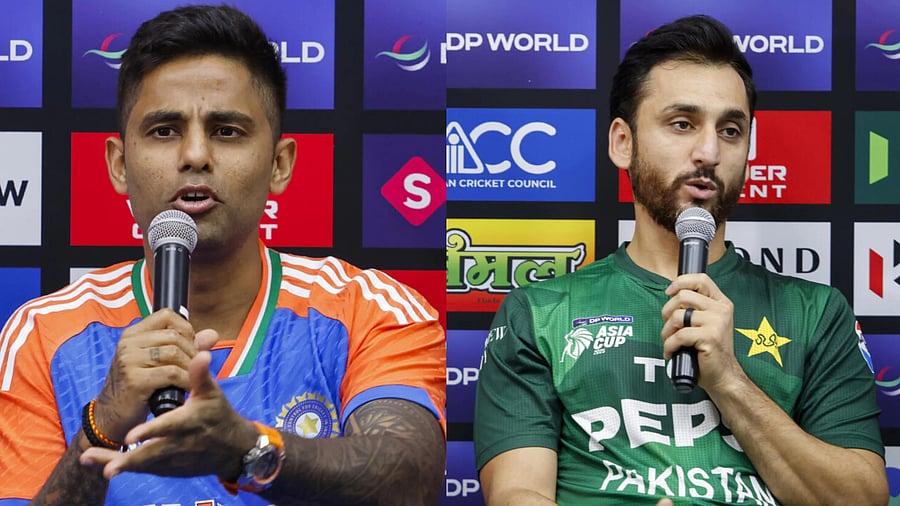
Indian skipper Suryakumar Yadav (left) and his Pakistan counterpart Salman Ali Agha.
Credit: PTI Photo
Dubai: Lop-sided or not, hyped up or otherwise, this is a rivalry that excites. Maybe not as much as it once used to, when the balance of power was equally divided, but given the history that unites and divides the two nations, India vs Pakistan will perennially remain a marquee contest.
The desert sands of Sharjah have been mute witnesses to numerous compelling battles between the sides, starting with the inaugural Asia Cup in 1984.
Packed houses, throbbing and thrumming with energy and electricity, were de rigueur, matches were decided by the smallest of margins including, most (in)famously, Javed Miandad’s last-ball six off Chetan Sharma in 1986.
Rivalry is perhaps a misnomer if the recent past is anything to go by. India have gotten on the bike and raced away, forcing Pakistan to play catch-up. The 2009 T20 World Cup champions have taken their time reacting. It’s only in the last few months that they have woken up to the necessity of drastically altering their approach to the 20-over game, following the arrival of New Zealand Mike Hesson as their head coach.
In any multinational cricketing spectacle, India vs Pakistan is easily the most eagerly awaited showdown. It’s no different this time, though Sunday’s T20 Asia Cup faceoff hasn’t generated the same interest or buzz of yore.
It’s the first time the sides are coming face to face since April 22 and the Pahalgam tragedy. Various quarters have castigated the Board of Control for Cricket in India (BCCI) and Suryakumar Yadav’s men for not boycotting the Pakistan game. It’s worth remembering that the BCCI and its employees are guided by the Indian government’s sports policy, which has greenlit playing Pakistan in continental and global competitions across disciplines while slapping a ban on bilateral action.
India embarked on the road to 20-over transition more than 14 months back, once Rohit Sharma and Virat Kohli called time on their international T20 careers. Pakistan have only recently embraced that path, reacting to a slew of defeats and the inability to keep pace with the cream, by moving on from the days of Babar Azam and Mohammad Rizwan, both former captains.
Salman Agha has been handed over the reins and presented with a promising bunch that is divorced from the baggage of the past, a past that includes 10 defeats in 13 T20Is to India.
Several in the Pakistani squad are still finding their feet and so carry the mystery of the unknown, but India will not be caught off guard. India have placed great faith in internalising and focussing on what they can do instead of obsessing over the opposition; that doesn’t mean they wouldn’t have done their homework and be unprepared for anything Pakistan might throw at them.
They will derive confidence from the knowledge that if they play anywhere close to their full potential, they will be practically impossible to stop. The trick therefore is to insulate themselves to the extent possible from the inevitable extraneous weight of pressure and expectations.
The protagonists are coming off commanding victories in their opening Group A fixtures, Pakistan matching India’s nine-wicket drubbing of UAE in a 17.4-over match with a crushing 93-run conquest of Oman on Friday. Neither was seriously tested though Pakistan are more battle-hardened, having only last weekend overpowered Afghanistan in the final of a tri-series in spin-friendly Sharjah.
A fresh surface will greet the teams at the Dubai International Cricket Stadium, where Pakistan have won two of the last three T20Is against India. What does Sunday have in store?